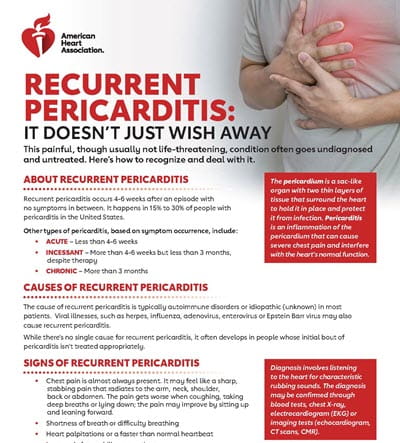Recurrent pericarditis is defined as the reappearance of pericardial inflammation after a symptom-free interval of four to six weeks following an initial episode. It represents a significant clinical challenge, characterized by repeated attacks of chest pain, elevated inflammatory markers, and potential complications impacting cardiac function.

Causes and Risk Factors Associated with Recurrent Pericarditis
While recurrent pericarditis is often idiopathic, several identifiable causes contribute to disease reactivation:
- Autoimmune Disorders: Systemic lupus erythematosus, rheumatoid arthritis, and scleroderma.
- Post-Cardiac Injury Syndromes: Post-myocardial infarction (Dressler’s syndrome) and post-pericardiotomy syndrome.
- Infectious Etiologies: Viral infections (e.g., Coxsackievirus, Echovirus), bacterial infections.
- Neoplastic Diseases: Secondary involvement of the pericardium.
- Genetic Predisposition: Familial Mediterranean Fever (FMF) and other autoinflammatory syndromes.
Factors such as premature corticosteroid use, non-compliance with colchicine therapy, and persistent viral infection increase the likelihood of recurrence.
Pathophysiology of Recurrent Pericarditis
The reactivation of pericardial inflammation involves complex immune-mediated mechanisms:
Failure to suppress the inflammatory response during the initial episode primes the pericardium for subsequent immune reactivation upon exposure to secondary stimuli.
Clinical Presentation of Recurrent Pericarditis
Patients typically present with symptoms mirroring their initial episode, including:
- Sharp, Pleuritic Chest Pain: Worsened by lying down, relieved by sitting up.
- Pericardial Friction Rub: High-pitched scratching sound on auscultation.
- Fever and Malaise: Indicating systemic inflammation.
- Elevated Inflammatory Markers: C-reactive protein (CRP), erythrocyte sedimentation rate (ESR).
Chronic recurrences may lead to constrictive pericarditis, manifesting as signs of right heart failure, including peripheral edema and ascites.
Diagnostic Approach to Recurrent Pericarditis
Accurate diagnosis relies on a combination of clinical criteria, laboratory findings, and imaging modalities:
- Electrocardiogram (ECG): Diffuse ST-segment elevation and PR depression.
- Echocardiography: Detection of pericardial effusion or thickening.
- Cardiac Magnetic Resonance Imaging (MRI): Visualization of pericardial edema and inflammation.
- Laboratory Tests: Elevated CRP, ESR, leukocytosis.
- Autoimmune Screening: ANA, rheumatoid factor, and specific autoantibodies.
Diagnosis is confirmed when two or more of the following are present: pericardial chest pain, pericardial rub, new ECG changes, or pericardial effusion.
Management and Treatment of Recurrent Pericarditis
First-Line Therapy
- Colchicine: 0.5–1.0 mg daily for at least six months, reduces recurrence risk significantly.
- Nonsteroidal Anti-Inflammatory Drugs (NSAIDs): Ibuprofen, aspirin, or indomethacin administered until symptom resolution and normalization of CRP.
Second-Line Therapy
- Corticosteroids: Low to moderate doses reserved for NSAID or colchicine intolerance or autoimmune-associated pericarditis.
- Immunomodulatory Agents:
- Azathioprine
- Methotrexate
- Intravenous immunoglobulin (IVIG) for refractory cases.
Emerging Biologic Therapies
- Interleukin-1 Inhibitors: Anakinra and rilonacept have shown remarkable success in patients with recurrent, corticosteroid-dependent pericarditis.
Prevention of Recurrence
Effective prevention strategies include:
- Extended Colchicine Use: Ensuring adherence to the full treatment duration.
- Gradual Corticosteroid Tapering: To avoid rebound pericarditis.
- Management of Underlying Diseases: Strict control of autoimmune conditions.
- Monitoring and Early Intervention: Regular follow-up visits to detect early signs of recurrence.
Patients are advised to avoid strenuous physical activity during acute episodes and recovery.
Complications Associated with Recurrent Pericarditis
Uncontrolled or frequently recurring pericarditis can lead to severe complications:
- Constrictive Pericarditis: Fibrosis and calcification impairing diastolic filling.
- Cardiac Tamponade: Life-threatening compression of the heart due to large pericardial effusions.
- Chronic Chest Pain and Disability: Resulting in reduced quality of life and functional capacity.
Prompt and aggressive management is critical to minimizing long-term morbidity.
Prognosis of Recurrent Pericarditis
Despite the chronicity and discomfort associated with recurrent pericarditis, the long-term prognosis is favorable for the majority of patients with appropriate treatment. Mortality is rare but morbidity from complications necessitates vigilant clinical care and patient compliance.
Recurrent pericarditis is a complex clinical entity requiring a multifaceted approach for successful management. With early recognition, judicious use of anti-inflammatory and immunomodulatory therapies, and patient-centered preventive strategies, we can achieve excellent control of symptoms and prevent progression to chronic pericardial disease. Future advancements, especially in biologic therapies, promise to redefine the therapeutic landscape and enhance outcomes for individuals battling recurrent pericarditis.